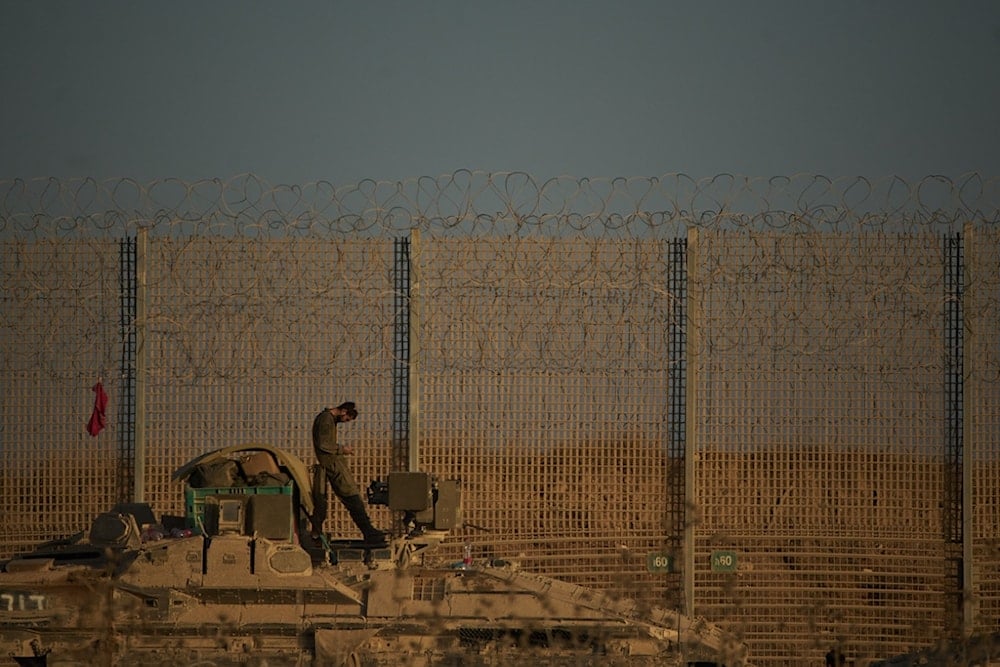Egypt seeks UN peacekeeping force in Gaza to oversee aid flow
Egypt’s FM Badr Abdelatty says Cairo is pushing for a UN peacekeeping mission in Gaza to monitor aid and support Palestinian self-governance.
-

An Israeli soldier stands on top of an armored personnel carrier (APC) parked in an area at the border with the Gaza Strip, as seen from southern occupied Palestine, Tuesday, October 21, 2025 (AP)
Egyptian Foreign Minister Badr Abdelatty announced that Cairo is working intensively to secure a United Nations Security Council resolution to establish a peacekeeping force in the Gaza Strip as soon as possible. The proposed mission would be tasked with monitoring the flow of aid funds and ensuring they reach their intended recipients.
In an interview with The National during his visit to Aswan, Abdelatty explained that the envisioned force would operate under an international mandate with a clearly defined scope set by the UN Security Council. He stressed that “it will not be acceptable for foreigners to administer Gaza,” clarifying that the mission’s role would be to “support Palestinians and enable them to manage their own affairs.”
Abdelatty emphasized that the initiative must first receive official authorization from the Security Council to legitimize the deployment and define the responsibilities of what he called an “international stabilization force.” He affirmed that Egypt is ready to participate “in all possible forms,” but only within “specific and transparent criteria.”
Next phase of ceasefire 'more complex'
The minister underlined that the mission’s goal must be peacekeeping, not peace enforcement, adding that both the proposed stabilization force and the “Peace Council”, reportedly to be led by US President Donald Trump and include international political figures, would also assist in supporting essential services in Gaza and training local police forces.
Abdelatty noted that the first phase of the ceasefire agreement has been largely implemented, but the second stage will be “far more complex.” This phase, he said, will focus on dismantling Hamas’ military infrastructure, ensuring a full Israeli withdrawal, and determining Gaza’s future governance structure.
He concluded by acknowledging the significant challenges ahead but emphasized that “the solution lies in adhering to the agreement and maintaining daily coordination with the Americans to ensure the continuation of the peace process.”
'Israel' wants war to continue
Israeli Police Minister Itamar Ben-Gvir has renewed calls for a full-scale military offensive on Gaza, warning Prime Minister Benjamin Netanyahu that continued restraint would jeopardize his government.
"I call on the prime minister to order the Israel [Occupation] Forces to fully resume combat operations in the sector with full force. The delusions that [the Palestinian Resistance] Hamas would change its ways or even adhere to the agreement it signed are proving, as expected, to be dangerous to our security. This neo-Nazi terrorist organization must be utterly destroyed, and the sooner, the better," Ben-Gvir said in a statement on Sunday.
His remarks came after Israeli military officials said militants in Rafah had fired sniper rounds and rocket-propelled grenades at Israeli positions, allegations that Hamas and the Al-Qassam Brigades have firmly denied. Reuters and other outlets report the Israeli strikes on Rafah were described by the army as a response to those alleged attacks, while Hamas reiterated that it was committed to the ceasefire and denied responsibility for the Rafah incidents.
A Record of incitement and provocation
Ben-Gvir's latest comments are consistent with his long history of inflammatory rhetoric toward Palestinians. A former disciple of the outlawed Kahanist movement, he has been convicted of incitement to racism and support for a terrorist organization. As a politician, he has repeatedly advocated reoccupying Gaza, encouraging the "voluntary emigration" of Palestinians, and imposing harsher conditions on prisoners.
In January, he declared that "Israel" should "conquer all of Gaza" and "eliminate every Hamas member," while earlier this year he dismissed global concerns over famine, saying he supported "starving Hamas in Gaza." His public remarks have often blurred the distinction between militants and civilians, reinforcing a narrative that frames Gaza's entire population as an enemy to be subdued.
Ben-Gvir has also been accused of abusing his authority to inflame tensions. During a prison visit, he reportedly taunted Palestinian political prisoner Marwan Barghouti by showing him a photograph of an electric chair. Human rights groups have denounced such behavior as psychological abuse and evidence of systemic dehumanization of Palestinians under Israeli control.

 4 Min Read
4 Min Read











